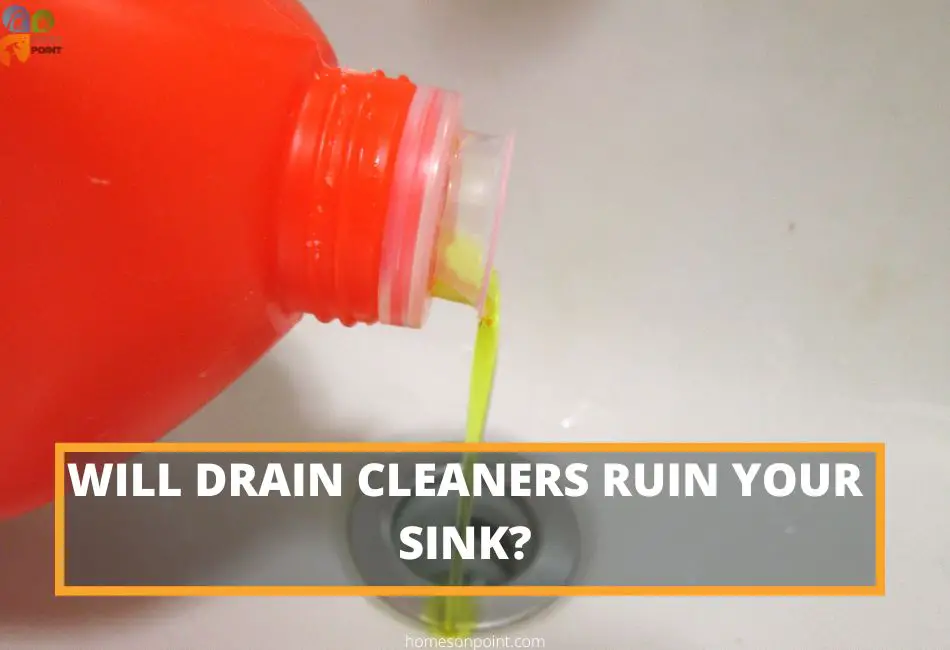Among other things, some of us wash and shave in our bathroom sinks. Others also dump food particles intentionally or unintentionally, into their kitchen sink drains. I am not judging but sooner or later, the sink is bound to get blocked and it will become difficult for water to easily drain out of it.
Blocked sinks are frustrating because apart from the possibility of leaving a stench in the space, the stagnant water will stain your sink. This is where drain cleaners come in.
As much as they may be the solution to the problem, drain cleaners may also cause some harm to the sink due to prolonged use or improper usage.
Overview And Composition Of Drain Cleaners
Drain cleaners are liquids, powders, solids, or equipment used to unclog sewers, pipes, or drains. Though drain cleaners are mostly produced in factories i.e. chemical drain cleaners, there are homemade drain cleaners that work pretty well too.
The first of these chemical drain cleaners are oxidizing cleaners which are mostly found and used in our homes, specifically our kitchen and bathroom sinks. Oxidizing drain cleaners always contain bleach, hydrogen peroxide, and nitrate, making them safe for use in the home environment.
Oxidizing drain cleaners are mostly liquid and sometimes powder which has to be mixed with water first before being poured into the drain.
Drain cleaners can also be caustic, consisting mainly of caustic soda or lye, potassium hydroxide, and aluminum oxide. These types come in solid form and need to be dissolved by adding water.
A fizzing reaction caused by adding water is what dissolved all the debris that may have blocked the drain. Caustic drain cleaners can also be safe and effective to use at home.
Another type of drain cleaner is an acidic drain cleaner. These types of drain cleaners are considered dangerous for the home unless being used by a plumber with the proper protective wear.
This is because, acidic drain cleaners contain high amounts of hydrochloric or sulphuric acid which “burns” almost anything it comes into contact with, including the skin.
As mentioned earlier, though these chemical drain cleaners are widely available, some pantry staples can be used to make a homemade drain cleaner that can equally work if you are lucky and the clogging is not too bad.
Do Drain Cleaners Ruin Kitchen And Bathroom Sinks?
Drain cleaners are primarily made to clean gunk and build-up in drains, pipes, and sewers. However, the improper and/or prolonged use of drain cleaners can ruin your bathroom and kitchen sinks.
I understand that whenever you realize that the water in your sink is not draining as fast as it should, it can be annoying but do not be in haste to grab a drain cleaner every time this happens.
Indeed, these drain cleaners are inexpensive, easy to use, and sometimes an easy fix to a clogged sink. However, in the long run, these drain cleaners cause some level of harm to your kitchen and bathroom sinks.
What Is the Potential Risk Of Drain Cleaners On Your Sink?
It is advisable to read the label of any drain cleaner before using it because some of these drain cleaners contain certain ingredients that may be harmful to your sink after prolonged use. Here are some potential risks.
1. Damage On Sink Finish
First of all, the finish of your sink can begin to deteriorate after using some drain cleaners for a while. Sink finishes such as porcelain and enamel can begin to deteriorate when they come into contact with some of the chemicals used in making some of these drain cleaners.
This means you could be solving the problem of your clogged sink but in turn, slowly damaging your sink.
2. Corrosion
Moreover, ideally, you should ensure that your drain cleaners have a corrosion inhibitor as, in its absence, your drain and pipes will rust eventually. Again, you may have succeeded in unblocking your sink but you will have more faults to fix afterward.
What Happens If You Use Too Much Drain Cleaner?
1. Damage To Sink
It is concerning to use too much drain cleaner. I get that they are mostly cheap, widely accessible, and easy to use but excessive use of them is not encouraged. Firstly, I have already highlighted that using too much drain cleaner can damage your sink and pipes by extension.
2. Damage To The Environment
Moreover, if you are a lover of the environment, you should be concerned that some of these drain cleaners are not environmental-friendly. Some drain cleaners consist of some chemicals which eliminate build-up in your drain but at the same time emit some substances that are detrimental to the environment.
3. Waste Of Time
Furthermore, if you are using too much drain cleaner, there just might be a possibility that the sink is not clogged with hair, grease, fat, or food particles but by items that the drain cleaner cannot dissolve.
What Precautions Should Be Observed When Using Drain Cleaners?
1. Read The Label
Before you bring any drain cleaner home, be sure to read the label. This helps you to know the ingredients in the drain cleaner and the directions for use. The label can also spell out which materials you cannot use the drain cleaner on. This information will certainly help you make a better choice.
2. Wear Protective Clothes
Also, if required, wear protective clothes, specifically gloves when using drain cleaners. Of course, be careful it does not splash into your eyes but because of the chemical compositions of drain cleaners, you may want to use gloves when using them. Also, wash your hands thoroughly after handling drain cleaners to avoid cross-contamination.
3. Cover Parts Of The Sink
If the label of the drain cleaner is clear that it may cause damage to certain materials and your sink is made of any of them, do cover those parts. For instance, if the drain cleaner you are using cause harm to enamel, it would be advisable to wrap the enamel part of your bathroom sink with paper before using the drain cleaner.
If you are too lazy to do so, you should be able to gauge properly when pouring the drain cleaner into the drain so it does not touch the enamel of the sink.
4. Do not use too much drain cleaner
Do not overuse drain cleaners. If you tend to use too much drain cleaner, especially in the same sink, the solution to the clog may be beyond a drain cleaner. Drain cleaners are meant to unblock sinks by “melting” fat, grease, hair, and food particles in drains. Therefore, if after using these drain cleaners several times and the problem persists, you need to stop.
Drain Cleaning Alternatives
Instead of reaching for your drain cleaner anytime your drain is blocked, why don’t you try these alternatives?
1. Homemade remedies
With ingredients that may you may have already or can get easily, you may be able to solve the problem of your clogged drain. Mix baking soda with hot water, add lemon juice and pour into your blocked sink. Then wash it down with hot water.
Alternatively, you can pour baking soda into your drain, add distilled white vinegar and wash it down with hot water.
2. Plungers
Using plungers is also another way of unclogging sinks. Simply fill the sink with water, make sure that the plunger covers the drain, and push it up and down several times. That action forces the stagnant water down the drain. You may have to repeat the up and down motion of the plunger a couple of times to ensure the sink is completely unblocked.
3. Plumber
Another alternative to using a drain cleaner is to call a plumber. Apart from the fact that the clogged or gurgling sink may be a result of an object that cannot be eliminated by a drain cleaner, a pipe may be broken somewhere, causing the blockage.
If this is the case, no amount of drain cleaner will solve the problem and the best thing to do will be to call a plumber to open up the pipes and check what is going on inside. However, if you are a hands-on person, you can get out your tools and unscrew the pipes yourself.
Conclusion
In conclusion, drain cleaners can help unclog your blocked drain. However, do not use too many of them. Also, be sure to read the label carefully and take precautions accordingly when using drain cleaners as they can be damaging in the long run.


